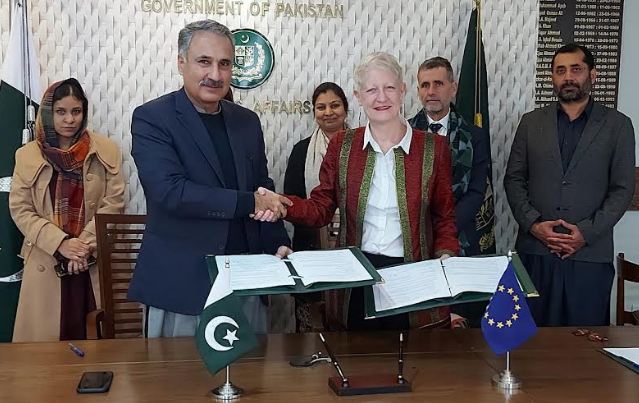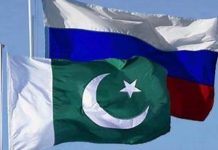Mahnoor Ansar/DNA
ISLAMABAD, JAN 9: To support green and inclusive economic growth in Pakistan, Dr. Kazim Niaz, Secretary Ministry of Economic Affairs and Dr Riina Kionka, Ambassador of the European Union have signed agreements for three new development programmes with a funding of EUR87 million by the European Union. With a focus on Khyber Pakhtunkhwa, Gilgit Baltistan and Balochistan, the new programmes will improve agricultural value chains, provide access to clean energy and enhance availability of the skilled labour force. The programmes are part of European Union’s support to Pakistan in the post flood rehabilitation and reconstruction.
These three programmes are designed in close cooperation with the federal and provincial governments and are part of the broader coordination efforts by the EU and its member states materialised through the Team Europe Initiative. They also contribute to EU’s Global Gateway, the European strategy to boost smart, clean and secure links in digital, energy and transport sectors and to strengthen health, education and research systems across the world.
Secretary EAD Dr. Kazim Niaz expressed gratitude for EU support and further said that “EU is the most valued development partner to Pakistan as it held a substantial grant portfolio in Pakistan wherein its focus is, in particular, on socioeconomic development of vulnerable communities. Clean and green energy is yardstick for any sustainable development, EU support in this particular area is necessary in providing desired impetus to all such efforts by Pakistan”. He further expressed his hopes that these three Financing agreements will further contributes towards strengthening socioeconomic indicators, as the rural economic transformation, provision of cheap energy and imparting much needed technical training for the youth can greatly benefit poor communities.
Ambassador Dr Riina Kionka pointed out: “Pakistan has a huge potential thanks to its people and natural resources. The programmes we have signed today help to harness that potential by giving Pakistanis the skills to get good jobs, by helping them to use sustainable techniques for agriculture and by providing them access to clean and green energy. Our support comes at a crucial moment, as the country is grappling with an economic crisis and people are still struggling with the effects of the terrible floods. We hope that the three programmes signed today contribute to economic recovery in the aftermath of the floods and make Pakistan stronger and more resilient.”
More details about the programmes signed today: KP Rural Economic Transformation (KP-RET) Project (EUR17 million) – The programme aims to improve rural households’ income by supporting farmers in the transition towards more sustainable and profitable agriculture, creating employment opportunities and focusing on youth and women. KP-RET is part of a larger agricultural development programme led by the Government of Khyber-Pakhtunkhwa, in which the EU contribution will ensure impact on the most vulnerable communities in rural areas.
ENERGY Plus: Energy for Climate Resilience in Gilgit-Baltistan and Chitral district in Khyber Pakhtunkhwa (EUR30 million) – The programme will create resilient hydropower facilities and support more efficient use of energy for a sustainable transition to renewable energy. It will also contribute to a more sustainable management of natural resources through a massive tree planting programme. Additionally, it will strengthen provincial government capacity for policy-making, with a focus on participatory planning, implementation and monitoring in energy and natural resources sectors,.
EU support for sustainable economic development through demand-driven Technical and Vocational Education and Training (EUR40 million) – The programme builds on the EU’s long-standing support to the Technical and Vocational Education and Training (TVET) sector in Pakistan. It will work on the provision of adequately skilled labour with a focus on environment friendly skills in the agribusiness, water and energy sub-sectors. The programme will make the national TVET system more effective and will give better access to skills and employment opportunities for returning and prospective migrants. Specific focus will be put on increasing availability of skilled female labour force in digital and high-tech sectors.=DNA
==================

















